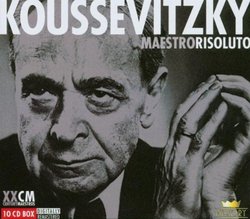| All Artists: Wolfgang Amadeus Mozart, Franz Joseph Haydn, Franz [Vienna] Schubert, Ludwig van Beethoven, Robert Schumann, Johannes Brahms, Hector Berlioz, Claude Debussy, Gabriel Faure, Maurice Ravel, Modest Mussorgsky, Alexander Scriabin, Pyotr Il'yich Tchaikovsky, Sergey Rachmaninov, Sergey Prokofiev, Dmitry Shostakovich, Richard [1] Strauss, Jean Sibelius, Roy Harris, Howard Hanson Title: Koussevitzky: Maestro Risoluto (Box Set) Members Wishing: 1 Total Copies: 0 Label: History Release Date: 4/28/2006 Album Type: Box set, Import Genre: Classical Styles: Ballets & Dances, Ballets, Forms & Genres, Concertos, Theatrical, Incidental & Program Music, Historical Periods, Modern, 20th, & 21st Century, Instruments, Strings, Symphonies Number of Discs: 1 SwapaCD Credits: 1 |
Search - Wolfgang Amadeus Mozart, Franz Joseph Haydn, Franz [Vienna] Schubert :: Koussevitzky: Maestro Risoluto (Box Set)
 | Wolfgang Amadeus Mozart, Franz Joseph Haydn, Franz [Vienna] Schubert Koussevitzky: Maestro Risoluto (Box Set) Genre: Classical
|
Larger Image |
CD Details |
CD ReviewsGiveaway Price for 10 (Yes - Ten!) CDs of Koussevitzky Doug - Haydn Fan | California | 08/28/2006 (5 out of 5 stars) "The Boston Symphony under the leadership of Sergey Koussevitzky came to be considered the Queen of American orchestras. The Boston boasted an unsurpassed refinement and a work ethic that no modern orchestra would tolerate. After a less than sterling Saturday concert Sergey hauled the whole orchestra in the following Sunday morning for extra work. Imagine trying that on today's card carrying Unionists! During Koussevitzky's tenure the orchestra premiered an astonishing number of 20th century masterpieces. It was Koussevitzky who commissioned from Ravel the famous orchstration of Mussorsky's Pictures at an Exhibition. Reading the long lists of American composers who had works first performed at Boston is flabbergasting.
As a conductor Koussevitzky excelled with the works of a surprising range of types. He was like Stowkowski a feverent proponent of Russian music and brought to it a barbaric splendour. Some of his greatest performances of Russian music never were released. (Much as I admire Monteux's way with Scheherazade the failure of RCA to capture the Boston in full flight under Koussevitzky remains a tragic mystery. A short video exists to tantalize us. Maybe one of the two airchecks will be released.) But Koussevitzky was more than just a specialist in Russian or modern composers. His performances of Beethoven can be surprising in their balance and verve, while his Brahms performances showed real insight. The Brahms 3rd is especially attractive and memorable. We are fortunate to have the Munch recordings with Boston of Debussy and Ravel, but the orchestra sheen and the inner balances heard in those beautiful transfers are all carried over from the magnificent creation Koussevitzky built. A famous critic once complimeted Koussevitsky on a especially evocative tone color in a piece by Debussy and the conductor shrugged his shoulders, and quipped, "Well, it only took ten years for them to get it!" On this CD box set there are a number of mainstream works normally considered not woth reissuing because they are in old mono sound. The Strauss tone poem Also Sprach was a very famous recording in its day - but in truth it has been utterly superceeded by the great stereo offerings of this work, starting with the Reiner and Chicago. Yet for those willing to listen the performance still showcases a string section of unrivaled beauties: the deep burnished sound of the deep basses, Koussevitsky's own instrument (He was a double-bass prodigy) play with a flexibility and imagination unimagineable prior to his leadership. (Though to be fair the Philadelphia basses were pretty amazing too!) Sadly the tone qualities of the higher instruments, violins and woodwinds in particular, are lost in a sonic smear of harshness. The eloquent close at the end of the tone poem exposing the quality of an orchestra's first chair players sounds here as little more than strident noise. Never-the-less there is still more than enough sound left to gain a good sense of the tremendous panache and virtuosity of the orchestra as a whole. Among the highlights and still very listenable I would cite the excellent and obvious groundbreaking performance of the Pictures at an Exhibiton along with a bewitching Night on Bare Mountain, the aforementioned Brahms 3rd, a heck of a Rachmaninoff Isle of the Dead, and still the best performance of the wonderful Harris Symphony No. 3. The Sibelius performances show why Sibelius thought so much of Koussevitzky, while the Copland Appalachian Spring reminds that Bernstein got started here as a young conductor. Not a bad protege! All in all a chance to hear a large number of Koussevitzky performances for the price of one or two CDs and make up your own mind. The CDs come in five two-packs with short notes on the composers and the same two page Bio of Koussevitzky. At this price the only caveat would be the sound. Several of the selections are from airchecks and vary from so-so to modestly acceptable. The actual studio recordings are usually better, with some better than others. To my ear overall it's okay, though nothing like some of the exceptional DGG historic (read mono) selections available. If you are willing to accept older sound on orchestra recordings, and especially when the actual sound of the orchestra is much of the reason one listens - then this issue offers quite a bonanza. And to be blunt the issue deserves a rating of 5 for price alone. Just look around at all the other Koussevitzky CDs, some going for forty or more dollars used! With this set you can test the waters and later, if you're still curious, try another Koussevizty CD that has been better reproduced. " |

 Track Listings (9) - Disc #1
Track Listings (9) - Disc #1